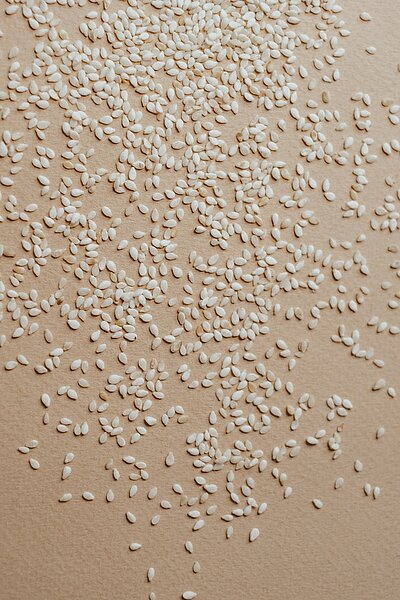Sesame

Sesame is a popular ingredient in many dishes, especially in oriental cuisine. But did you know that sesame seeds can also be healthy for dogs? In this article, you'll find out what sesame is, what benefits and disadvantages it has for your dog and how to feed it correctly.
What is sesame?
Sesame is a plant from the sesame family, which is primarily known for its oily seeds. The seeds are small, oval and have a brown, black or white color. They have a nutty flavor and are often used roasted or ground.
Sesame originally comes from India and is now cultivated in many tropical and subtropical regions of the world. It is one of mankind's oldest cultivated plants and has been used as a food and remedy for thousands of years.
What are the benefits of sesame seeds for dogs?
Sesame seeds have many health benefits for dogs, as they contain important nutrients such as
- Vitamins:Sesame seeds are rich in vitamins A, B1, B2, B6, C and E, which support your dog's immune system, skin, coat and digestion.
- Minerals: Sesame seeds provide calcium, potassium, magnesium, phosphorus, iron, zinc and selenium, which are important for the health of your dog's bones, teeth, nails, hair and muscles.
- Amino acids: Sesame seeds contain all the essential amino acids your dog needs to build protein.
- Fatty acids : Sesame seeds are a source of unsaturated fatty acids such as palmitic acid, stearic acid, oleic acid, linoleic acid and linolenic acid, which have an anti-inflammatory effect and protect your dog's cardiovascular system.
Sesame can therefore help to keep your dog fit and healthy. Sesame can also serve as natural protection against parasites such as fleas or mosquitoes, as it emits an odor that deters these insects.
What are the disadvantages of sesame seeds for dogs?
Although sesame seeds are healthy for dogs, they also have some disadvantages that you should be aware of:
- Calories: Sesame seeds are very high in calories and can therefore lead to obesity if you feed them too often or too much. One teaspoon of sesame seeds has about 50 calories.
- Allergies: Sesame seeds can cause allergies in some dogs, especially if they are sensitive or allergic to other seeds or nuts. Symptoms can include itching, skin rashes or gastrointestinal problems.
- Digestion: Sesame seeds can be difficult for dogs to digest, especially if they are fed raw or unground. This can lead to flatulence or constipation.
How to feed sesame correctly?
If you want to feed your dog sesame seeds, you should follow a few tips:
- Amount: Only ever feed small amounts of sesame as a supplement to your dog's normal food. One teaspoon per day is sufficient for a medium-sized dog.
- Preparation: Lightly toast the sesame seeds in a pan without oil or fat. This makes it more digestible and aromatic. Then crush the sesame seeds with a mortar or food processor. This makes it easier for your dog to absorb and digest.
- Quality: Only buy high-quality organic sesame seeds without additives or harmful substances. Pay attention to the best-before date and store the sesame seeds in a cool, dry place.
Sesame is a healthy food for dogs that provides many important nutrients and can serve as natural parasite protection. However, sesame should only be fed in moderation and in the right form to avoid possible disadvantages such as calories, allergies or digestive problems.
If you notice any signs of hypersensitivity or poisoning in your dog, you should see your vet immediately. We are not a substitute for a vet, but we try to be as accurate as possible. Every dog reacts differently and we recommend you get a second opinion or consult your vet if in doubt.
Stay healthy and take good care of your four-legged friend!😊